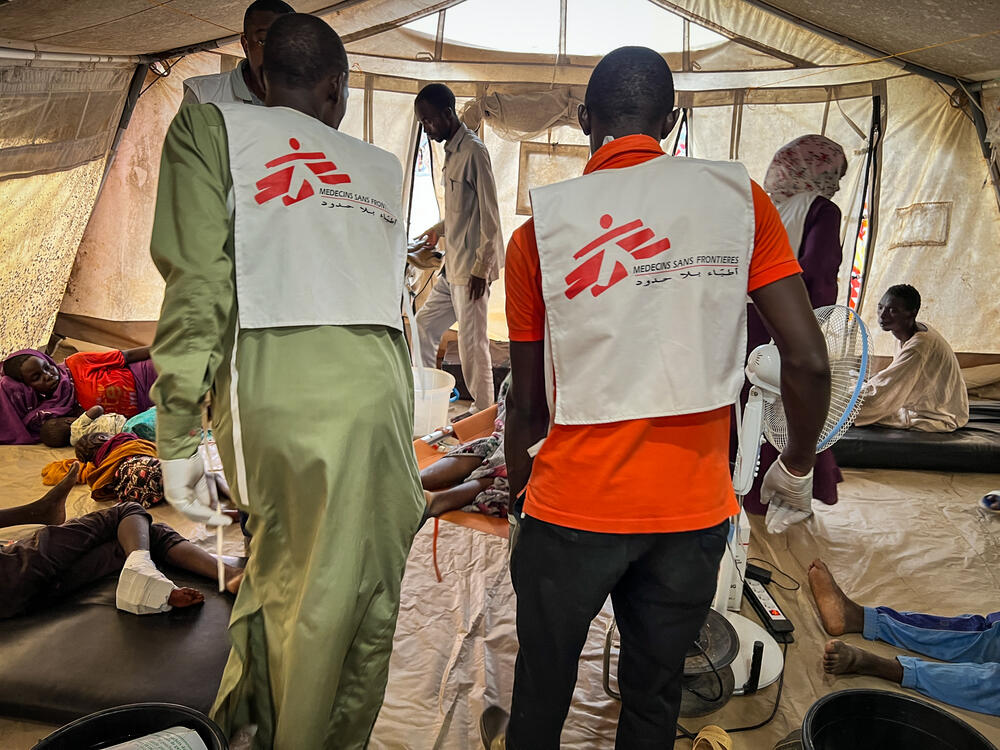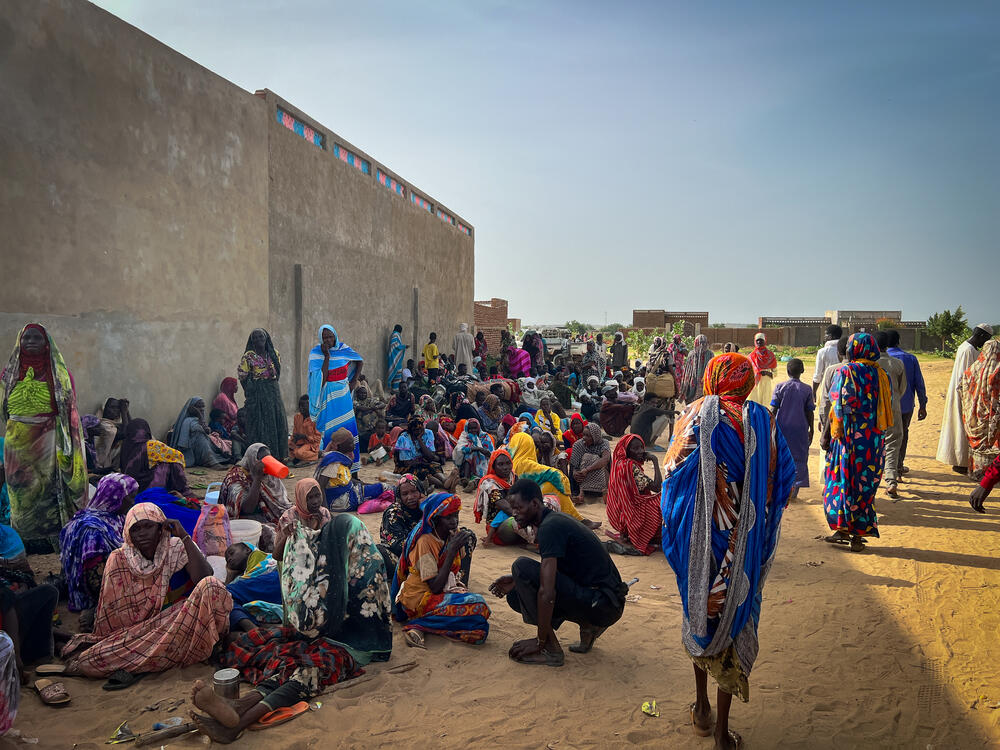Sudan crisis: MSF hospital treats 348 war-wounded patients in a single day
In the Chadian town of Adré, close to the border with conflict-hit Sudan, around 15,000 refugees have arrived in just four days. Among them are almost 900 war-wounded people.
Many are fleeing directly from the state of West Darfur and its capital El Geneina around 22 miles from the border. Meanwhile, there are consistent reports of people being shot and killed as they try to leave the city and escape to Chad.
These are reports that match the injuries seen by Médecins Sans Frontières / Doctors Without Borders (MSF) teams supporting Adré Hospital.
In a single day, 16 June, medical staff here saw 348 war-wounded patients. Many arrivals have sustained bullet wounds in their buttocks and kidneys as they fled, while others – including young children – have been hit in the head and chest.
Now, MSF is urging all armed groups in and around El Geneina to spare the civilian population and to let people who want to safely leave the area.
The dangerous decision to leave
After nearly two months of blockade and large-scale violence in El Geneina, thousands of people are giving their all to escape the siege and attacks.
“On 14 June 2023, the governor of West Darfur was killed," explains Nour, a 25-year-old from El Geneina who arrived at Adré Hospital on 15 June.
"At this moment we knew that the situation would get even worse, and it was a collective decision of the people of El Geneina to leave.
“Most of them fled on foot heading northeast of El Geneina but many of them were killed on this route. I can’t tell how many, but I saw many dead and wounded people lying on the ground.
“The only solution was to head west and people started walking to Adré in Chad, but the journey was full of dangers as we were exposed and targeted.
“On Thursday at 11 am while I was walking near a town called Shukri, an armed man shot me in the face but thank God I survived to be treated here in Adré Hospital.”
Being shot at is not the only danger on the road for people desperate to flee El Geneina.
On 15 June, around noon, 18-year-old Salma* and her two sisters were fleeing the chaos in the city. However, their escape was abruptly halted when six armed men arrived in a bus. The men wrenched Salma’s sister, Soadd*, away from her terrified siblings and raped her.
“They kept her for some time inside the bus,” says Salma.
“After they finished with her they threw her out of the bus and they left. My sister is only 15 years old.”
On 16 June, 348 people injured due to conflict in Sudan arrived in a single day at Adré Hospital, eastern Chad.
— MSF UK (@MSF_uk) June 21, 2023
Abderahman Ibet, assistant project lead in Adré, talks about how we're responding👇 pic.twitter.com/Ah2T4dxyx4
Soadd is currently fighting for her life in Adré Hospital, where she is receiving critical medical support.
At the same time, the three sisters are facing not only the trauma of violence but also the anguish of being separated from their parents in this time of crisis. They have lost contact – their mother is in Nyala, and there is uncertainty about their father’s whereabouts.
Escalating violence
Since the violence first erupted in Khartoum on 15 April, triggered by clashes between the Sudanese Armed Forces and the Rapid Support Forces, unrest has spread and spiralled across the country.
In places like El Geneina, the situation has become uncontrollable and chaotic, now with inter-communal violence involving young adults from local tribes that have exacerbated the insecurity.
“The level of violence has been escalating," says Konstantinos Psykakos, MSF’s outgoing project coordinator.
“People have felt and continue to feel exposed at any given moment to the risk of being targeted or exposed to violence.”
Konstantinos had spent the last two months in Adré organising attempts to access El Geneica with medical care.
How can I help MSF in Sudan?
Right now, our teams in Sudan are treating patients injured or affected by the conflict. This is only possible because of donations from people like you.
By giving to our general funds today, you will be helping ensure we can respond to emergencies around the world, including in Sudan.
Please donate today to support our emergency teams.
Click here to learn more about how we spend your money
£24 could pay for 3 splints used to immobilise limbs in injured patients
The generosity of people like you means expert MSF medical teams can deliver essential medical care to people in conflict zones across the world.
Eyewitness accounts from the patients who arrived at Adré Hospital told our teams about mass killings, displacement, looting, women escaping alone with children, and dead bodies in the streets.
Nour recalls the hardship of surviving in El Geneina over the past few weeks:
“No one was allowed to go in or out. We didn’t have clean water to drink as the armed groups destroyed it. People tried to get clean water from some wadis or natural running water, but snipers were shooting at them.
“They came to the neighbourhoods on pickups and motorbikes, fully armed with machine guns and aircraft guns mounted on their pickups. They were killing anyone they saw then looting houses and burning the neighbourhood.”
Salima, 27 years old from El Geneina, escaped alone with her five daughters and two boys after she was shot in the right leg while walking near her house. She suffered multiple fractures as a result of the wound.
“This happened two days ago, but yesterday a helpful man carried me and my kids in his pickup truck to Adré,” shares Salima.
“I don’t want to go back home because the unthinkable is happening. Men and boys are being killed, and sometimes the armed men let women flee and sometimes not.”
During this chaos, Salima lost contact with her husband. She has still had no news about him.
MSF is calling on all parties to the conflict in and around El Geneina to spare civilians and vital infrastructure, as well as to let people who want to leave the city flee unharmed.
We are also making an urgent call for humanitarian teams to be able to access the city and provide support so that the wounded and sick can be cared for.
* Names have been changed to protect identities
MSF, conflict and war
In conflicts and war zones, MSF does not take sides. We provide medical care based on needs alone and try to reach the people who need help most.
If warring parties see aid organisations as being on one side of a conflict, we are less likely to gain access to those in need and more likely to be attacked.
One of the ways in which we are able to demonstrate our independence to warring parties is to ensure that all our funding for work in conflicts comes from private individuals – we do not accept government grants.

